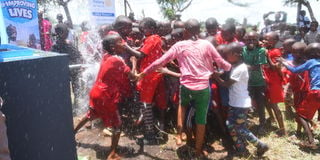Matepes residents get safe drinking water for the first time in 25 years

Pupils at Matepes Primary School enjoy themselves during the commissioning of the water project by Rotary Club Kitengela on World Water Day.
What you need to know:
- The project will be beneficial to the learners and the entire community.
- Area residents have in the past been exposed to waterborne diseases.
For residents of Matepes area in Rombo, Kajiado County, access to safe water has been a pipe dream for decades.
Daily treks for several kilometres in search of water have been the norm in the area with women and children bearing the brunt.
But their 25-year wait for safe and clean water has finally become a reality following the launch of a Sh7 million water project at Matepes Primary School during the World Water Day celebrations.
The project, an initiative of Kitengela Rotary Club, will be beneficial to the learners and the entire community.
Purity Sieyan, a resident of the area, said in the past they have been walking for more than 20 kilometres to get water.
However, she said, the water is often unsafe and has exposed them to waterborne diseases such as cholera and typhoid.
Another area resident, Esther Ndung’e, termed the project a huge relief for them.
“We have suffered a lot. We have had to walk for more than an hour every day in search of water," Ms Ndung’e said.
Kitengela Rotary Club president Daniel Wanjuki said the fully-equipped borehole will ensure the school and the larger community have access to safe water for domestic use.
He said 30,000 litres of water can be pumped from the borehole, which uses a solar system, every hour ensuring a reliable supply of the commodity.
“The project will ensure the school has clean drinking water, water for domestic use both for the learners and the community,” said Mr Wanjuki.
Davis & Shirliff, as one of the partners in the project, donated a solar system to provide a renewable source of power.
Ongata Rongai branch manager Amos Mutunga Branch Manager said the solar modules reduce greenhouse gas emissions therefore mitigating climate change while providing sustainability to the community project.
Rombo Division Assistant Commissioner Rispah Kitum said area residents have in the past been exposed to waterborne diseases due to the consumption of unsafe water.

Daniel Wanjuki, the President Rotary Club Kitengela, when he officially commissioned the water project at Matepes Primary School in Kajiado County on World Water Day.
She said the project will ensure locals get water from a safe source unlike in the past when they relied on contaminated water from rivers.
“Many cases of patients in hospitals are due to consumption of unsafe water. When people have access to clean water, they will lead a healthy life. Women will also have time to do other chores as they will no longer walk long distances looking in search of water,” said Ms Kitum.
“Also cases of children failing to attend school as they join the search for water will also come to an end. Having this water project here will help them a lot,” she added.
Matepes Primary School head teacher Mr Samuel Karanja said the 496 learners in the school have suffered for a long time but there is relief for them now.
“We have faced challenges in accessing water. The water we have been using is contaminated by pesticides and other impurities leading to several diseases. We are happy with this project,” said Mr Karanja.
“We are also happy that the time our learners usually lose as they look for water will now be used in learning,” he added.
Most parts of Kajiado County experience drought which usually results in residents walking long distances in search of water.
The rivers in the area are also seasonal, forcing the community to rely on water from highly contaminated sources such as dry river beds, silanga (water pans) and unprotected open wells.
Without a reliable source of water, both man and animal often share a common water source, which is contaminated by the livestock’s faecal matter.
The share resources in the area have also in the past led to an upsurge in human-wildlife conflicts.
Area senior chief Mr James Tikwa said the community is happy to have the project as it will reduce cases of human-wildlife conflict over water.





